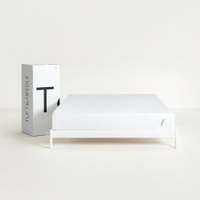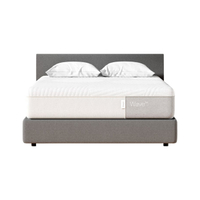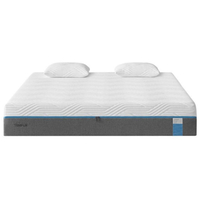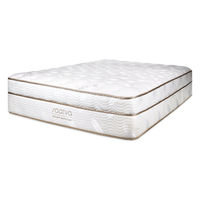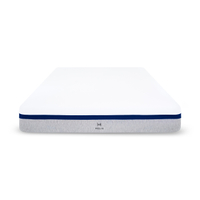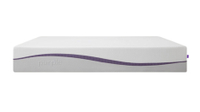Full vs queen mattresses: Which size is best for your sleep?
Everything you need to know about full vs queen mattresses
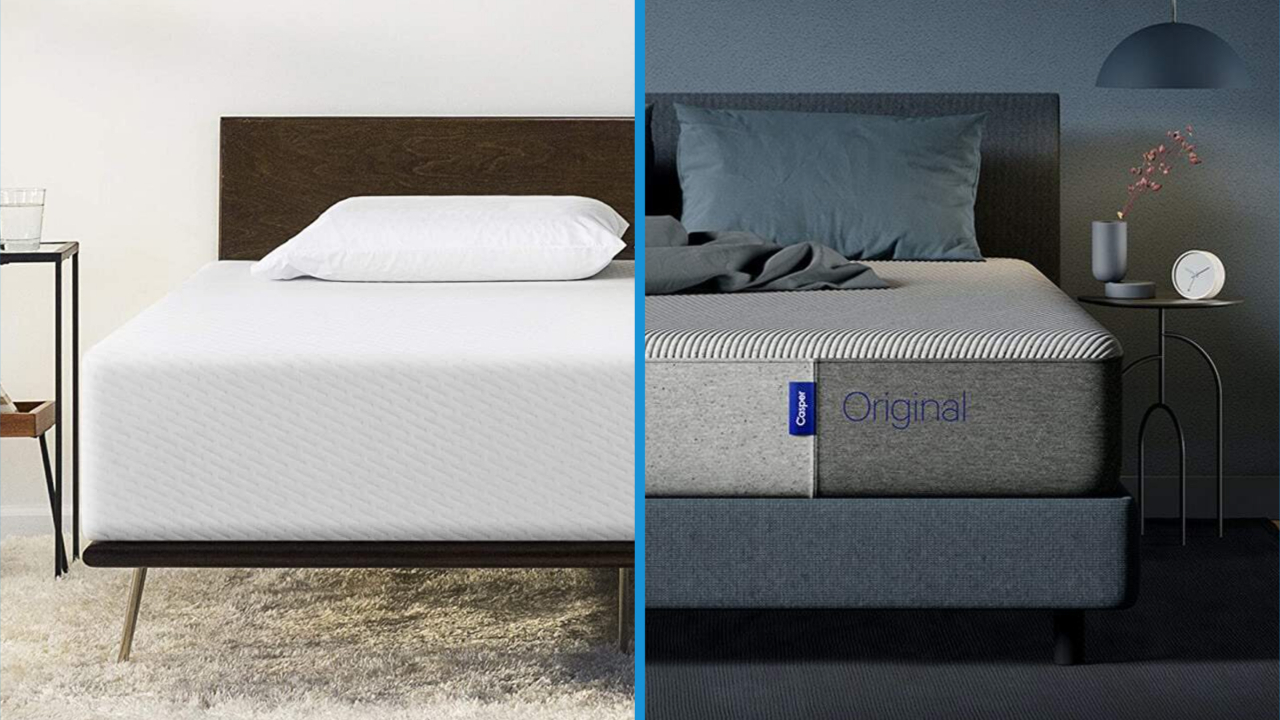
When deciding between a full vs queen mattress, it helps to know what the main differences are between the two sizes so that you can figure out which one suits your sleep needs. Several different factors affect this, including your height and body type, the available space in your bedroom, and whether you sleep solo or share a bed.
All of our best mattress brands make full and queen size options, although you can find a narrowed-down list in our best queen mattress round-up. Our individual queen bed size and full bed size explainers offer more info on individual dimensions, but these are easy mattress sizes to cater for. But which of the two will help you spread out comfortably and get the deep rest you need?
In our full vs queen mattress size comparison, we look at the main benefits and drawbacks of each, who they are well suited to, and what you need to know about both before making a decision. And if you need more space, read our queen vs king mattresses comparison for the two largest sizes outside of Cal king.
Full vs queen mattresses: Key differences
- Full mattresses are smaller and cheaper
- Queens are wider, longer and more expensive
- Full suits solo sleepers; queen suits couples
Knowing the key differences between full versus queen mattresses is crucial if you want a good night’s sleep, which includes staying cool and comfortable whether you sleep solo or with a partner.
The main difference is that a full mattress measures 54 x 75 inches, while a queen mattress measures 60 x 80 inches, meaning it’s wider and longer. This makes a full size the better option for solo sleepers who want more room than a twin XL offers (38 x 80 inches), including older children and teens. A queen size is better suited to couples, although this could still be too narrow compared to a king size (76 x 80 inches), depending on your body size.
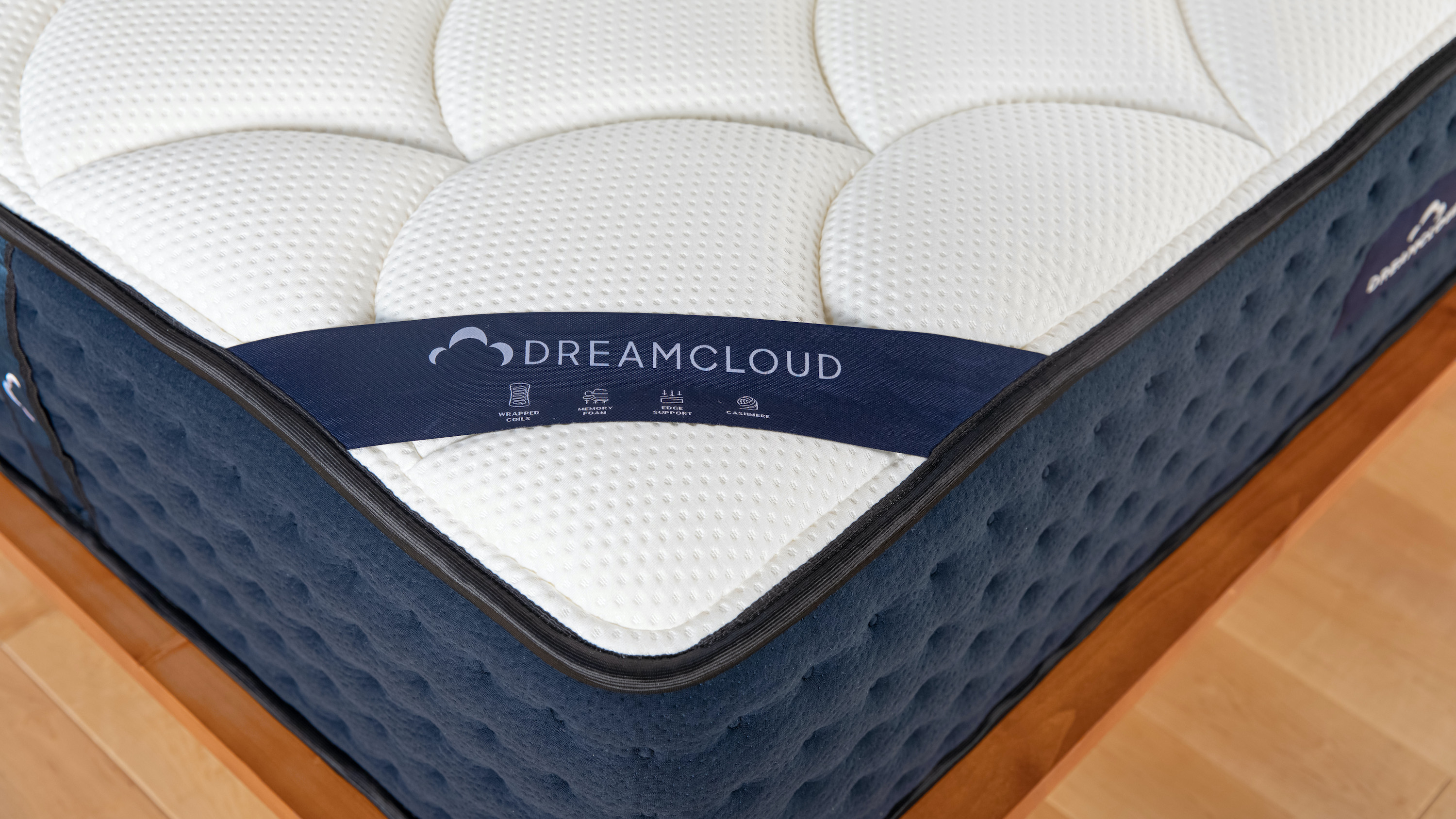
There’s also the size of your bedroom to factor in—namely, the space you have for a bed. If you’re looking for a smaller bed for a guest room, but you want something bigger than a twin, then a full mattress will sleep one person comfortably. If there’s two of you sharing a bed yet you don’t have space for a king size, a queen is the better option.
All of the best memory foam mattresses are available in full and queen sizes, as are hybrids, organic mattresses, innerspring models (including traditional ones sold in store), and cooling mattresses.
Full vs queen mattresses: Dimensions
- A full size mattress measures 54” x 75”
- A queen size mattress measures 60” x 80”
- Both are larger than a twin yet smaller than a king
If you are short on bedroom space, a full or queen size mattress is a good solution depending on your height, body type and whether you sleep alone or share a bed with another person or a pet. While co-sleepers can squeeze onto a full size, unless they have very small bodies, this is a less than ideal sleeping arrangement.
How come? The body needs to be positioned comfortably in order for the spine to be properly aligned, which might not happen if you are cramped. As a result, you’ll struggle to get comfy, which could wake you up, you’ll keep rolling into your bed buddy, and you have a higher chance of waking up feeling stiff and sore.
If you are tall, a full mattress will be too short for you, so switching to a queen should help you feel more comfortable as the extra inches means you can stretch out. That said, if you are very tall, you’ll be better off on a Cal king size (72 x 84 inches long).
Most of the best mattress in a box options have a full range of sizes including full and queen, and as nearly all of them offer trial periods, you’ll have time to test it out at home to make sure you have picked the right size for you. Most trials last for around 100 nights, which is much longer than the expert-recommended three weeks (how long it takes for your body to get used to a new bed).
Full vs queen mattresses: Pros and cons
- Both are good space-savers
- Both sizes are widely available
- Big and tall sleepers will struggle on both
Before you commit to either a full or queen mattress, it’s good to know the main pros and cons of each. Namely, if you’re a solo sleeper of average height or shorter, then a full mattress is perfect. Taller solo sleepers will sleep better when stretching out on a queen size.

Couples could struggle with both sizes though. A full size will be too much of a squeeze, while taller and larger couples might even struggle to get comfortable on queen size beds.
An obvious advantage is that either a full or queen mattress will fit into smaller homes more neatly, and give you enough space in a smaller bedroom for other key pieces of furniture.
If you are short on budget as well as space and you sleep alone, then a full is smaller and cheaper than a queen mattress. The bedding will be cheaper too, and if you’re buying direct from a mattress brand, keep an eye out for mattress sales to get discounts on a range of pillows, bed sheets, comforters and more.
Full vs queen mattresses: Prices
- Full size is cheaper than queen size
- A mid-range full mattress costs around $650
- A mid-range queen costs around $900
Full and queen sizes are widely available to buy online, whether you are looking for a budget-friendly choice or a handcrafted luxury option. As such, prices vary widely according to materials, build and quality. However, if you are trying to choose between full and queen in the same model, a full size will be cheaper, simply because it’s smaller and requires fewer materials to manufacture.
Here are some typical prices of full vs queen mattresses for some of the best mattresses in the US right now:
| Cocoon by Sealy Chill Memory Foam | Full RRP: $969 | Queen RRP: $1,239 |
| Saatva Classic | Full RRP: $1,595 | Queen RRP: $1,695 |
| Casper Original | Full RRP: $1,195 | Queen RRP: $1,295 |
| Avocado Green Eco Organic | Full RRP: $899 | Queen RRP: $999 |
| Nectar Memory Foam | Full RRP: $1,298 | Queen RRP: $1,398 |
| The DreamCloud | Full RRP: $1,598 | Queen RRP: $1,698 |
Full vs queen mattresses: What is a full size?
- Full mattresses measure 54” x 75”
- It’s an ideal size for solo sleepers
- It also works well for smaller rooms
With a width of 54 inches, full mattresses are a comfortable choice for solo sleepers, including adolescents needing to upgrade from a twin. While co-sleepers can share a full size bed, it will be a squeeze and getting the space and physical comfort needed for healthy sleep would be tricky.
Full size beds are less expensive than queen size beds and are easy to find sheets and accessories for. They are also less heavy to move, rotate, or flip, making them easy to manage on your own (for guidance, read our feature on how often should you rotate a mattress).
Overall, if you have a smaller bedroom or need less space when you sleep, then a full size should give you what you need. If you are taller than average though, go for a queen size instead as these have more space for you to sleep comfortably.
Here are some of our favorite full mattresses to check out…
Tuft & Needle Original full: $795 at Tuft & Needle
If you’re looking to stay cool and comfortable during sleep, the Tuft & Original is a great choice with two layers of foam, including a cozy 3-inch layer of adaptive foam infused with graphite and cooling gel to regulate temperature.
Casper Wave Hybrid Snow (full): $3,245 at Casper
Take advantage of money off this superb cooling hybrid featuring Casper’s cooling Snow Technology designed to regulate body temperature. Other key design features include zoned support and a QuickCool cover for greater comfort. In the Casper mattress sale, you can often save 15% on a queen size.
Tempur-Pedic Cloud (full): $2,099 at Tempur-Pedic
The Cloud mattress features layers of Tempur-Pedic's own NASA-derived Tempur material that contours to your body and relieves sore joints. As well as top-notch support from the base layer, there’s a softer layer in the middle providing cushioning and ease along the body. In the Tempur-Pedic mattress sale, you can often save 30% on a queen size.
Full vs queen mattresses: What is a queen size?
- Queen mattresses measure 60” x 80”
- This size is better for co-sleepers/taller individuals
- Queens fit better in average-sized bedrooms
Queen size mattresses are a convenient shape and size for co-sleepers looking for a more compact size than a king, while also giving them enough room to sleep comfortably. This size is also a good option for taller solo sleepers, as well as solo sleepers who allow pets on the bed or who co-sleep with their children.
Because queen mattresses are larger than full ones, they are heavier and trickier to move, which is worth bearing in mind if you live by yourself. If you are looking to furnish a guest room for two yet want to keep the cost down, then a queen is an excellent option. Here are some of our favorites to check out…
Saatva Classic (queen): $1,695 at Saatva
In the Saatva mattress sale, you can save up to $250 on this luxury innerspring hybrid. With a choice of two heights and three firmnesses, there’s plenty of tailored comfort to suit all sleeping positions. When on sale, you can snap up a queen size for around $1,495 and you’ll get a 180-night trial.
Helix Midnight (queen): $1,049 at Helix Sleep
This medium-feel foam hybrid is the best mattress for side sleepers of all body shapes and sizes. And to help you sleep more soundly, the latest Helix mattress deals knock $150 off the price and throw in two free pillows. That reduces the price of a queen size to $1,099 (was $1,199).
Purple Plus (queen): $1,649 at Purple
This cozy mattress uses Purple's own GelFlex layer to cushion and support the body, while more than 1,400 air channels guarantee better airflow for a more breathable sleeping experience. Purple offers a risk-free 100-night sleep trial too, so you'll have ample time to try it out.
Should you buy a full or queen mattress?
Both are a great choice if you are short on space, but while full mattresses are generally better suited to solo sleepers, queen mattresses can more comfortably accommodate co-sleepers.
Full size is also cheaper, making it a budget-friendly option for guest rooms or adolescents looking to upgrade from a twin size. If your bedroom is on the small side, then a full size will be a good fit, although it would be too much of a squeeze for larger co-sleepers.
Both sizes are widely available, with plenty of deals available throughout the year from mattress brands including Nectar, Purple and DreamCloud. So to sum up, full mattresses are smaller and cheaper than queens, and suit single sleepers better, while queens are larger and more expensive than full, and suit couples and bigger bedrooms.
- The best smart beds and mattresses for better sleep
- The best mattress protectors for all budgets
Sign up to get the BEST of Tom's Guide direct to your inbox.
Get instant access to breaking news, the hottest reviews, great deals and helpful tips.
Grace is an experienced sleep writer and mattress reviewer who also contributes to our sister site TechRadar, among other Future plc brands. She's a big fan of organic sleep products and has recently invested in a wool mattress topper that she quite happily describes as "life-changing." (Hey, we're serious about our sleep products). When she isn't testing mattresses or writing about sleep, Grace enjoys reading and creative writing, and incorporates meditation and yoga into her wellness routine.
